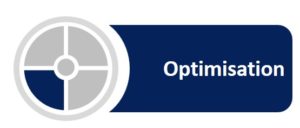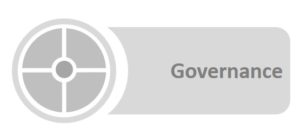
WE ADD VALUE ACROSS THE WHOLE SOURCING LIFECYCLE.
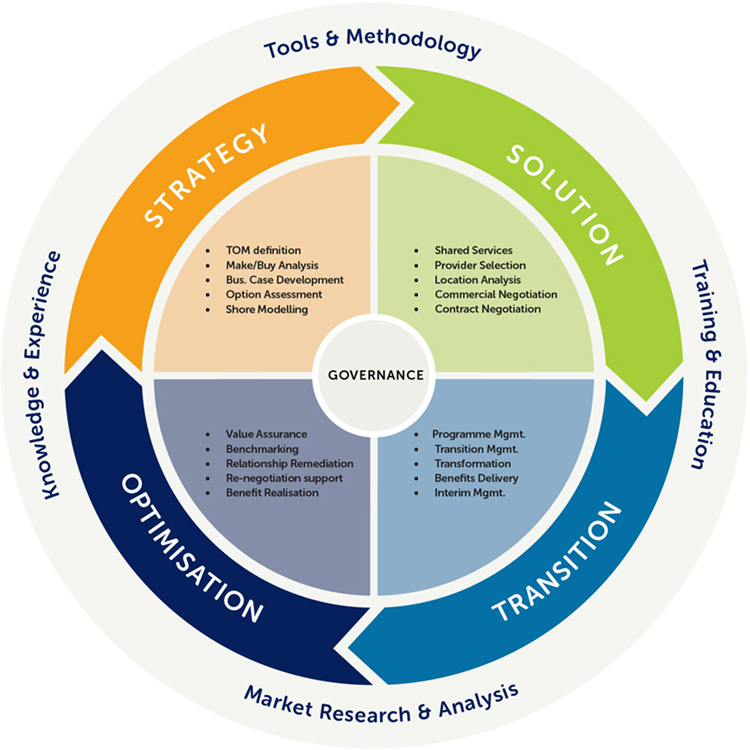
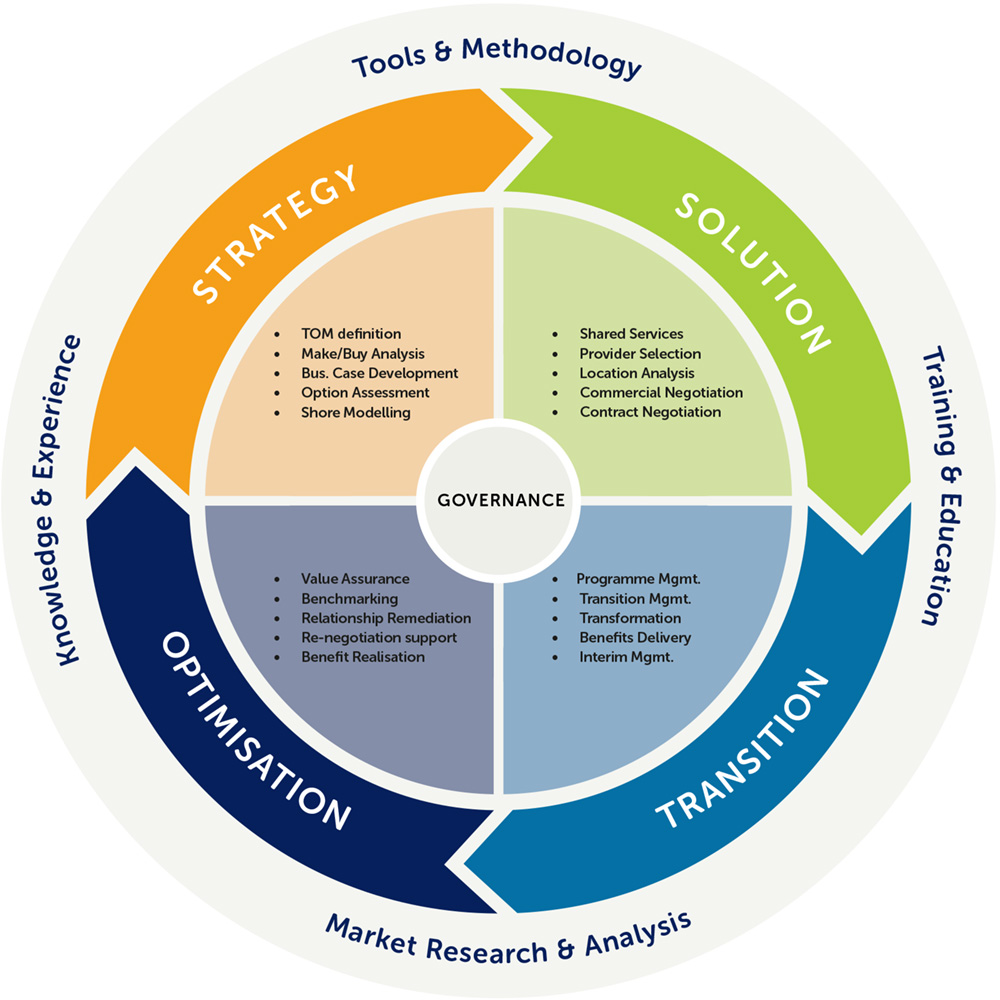
The Sourcing Lifecycle applies equally to Outsourcing and Shared Services arrangements, and is regardless of whether the ‘Service Provider’ is internal to the organisation or an external third party. To maximise the value of Sourcing and minimise the risks, it is important that all aspects of the Lifecycle are considered appropriately from Strategy, through Solution Definition, Transition, to Service Optimisation, and as importantly the Governance that underpins it. The Sourcing Lifecycle is both a journey and a process.
Hillbrooke adds value to its Clients across the whole Sourcing Lifecycle. We apply our knowledge, experience, and methodology to your unique business situation to deliver tangible business outcomes.
Strategy
Sourcing Strategy is all about developing an effective plan to best source any given process, activity or service. The Sourcing Strategy is a key component of an effective Operational Strategy, with Sourcing often used as a transformational lever to deliver a step-change cost reduction and operational service performance.
Typically Sourcing approaches in organisations have ‘evolved’ over time and are rarely the result of a considered holistic Sourcing Strategy. An organisation’s Sourcing landscape often reflects a myriad of tactical initiatives that have addressed isolated functions or activities, and in many cases have been dictated by individual manager preferences. This has usually resulted in a complex and confused Sourcing landscape with variations in service delivery by business unit, division, country operation, function, and service/process.
At worst the lack of an effective Sourcing Strategy can result in a ‘hotchpotch’ of Outsourcing and Shared Services arrangements with multiple Service Providers doing different elements of service and process. To compound this, the arrangements are often on a different commercial basis, with different objectives, varying service levels, ambiguous interfaces and inconsistent management and oversights. They are frequently lacking in operational integration, which usually results in poor quality of service provision and a very cost inefficient operating model. A ‘best in class’ business will develop Sourcing Strategies that are holistic and that are an integral component of a well thought through Operations Strategy that directly underpins the delivery of the Business/Corporate Strategy.
The characteristics of a good Sourcing Strategy include;
- Underpins the delivery of the Business/Corporate Strategy.
- An integral component of an overall Operational Strategy and Transformation Plan.
- Addresses the ‘make or buy’ decision as to what is core/non-core to the Business or more importantly what differentiates the Business and adds value.
- Provides a clear vision of the future Sourcing landscape.
- Considers the current Sourcing arrangements identifying the challenges, inconsistencies, and opportunities.
- Considers the key alternative Sourcing approaches – Inhouse/Captive, Shared Services and Outsourcing – from both a financial and non-financial perspective.
- Considers the Shore Strategy – what to do on onshore/near-shore/off-shore along with what should be done in-country, regionally, or globally.
- Considers the Location Strategy identifying appropriate locations for Service Delivery Centres (SDCs) balancing economies of scale with concentration risk.
- Considers developments in the wider marketplace and how competitors are leveraging Sourcing.
- Provides stakeholders and decision-makers with a uniform and consistent view to support a transparent decision-making process.
- Considers the implications on ongoing Governance, Retained Organisation and Transition.
- Enables well-thought decision making based on risks, financial and organisational consequences.
- Provides a practical roadmap to delivering the Strategy vision along with specific plans to align and develop existing Sourcing arrangements recognising constraints such as existing contractual agreements and programme inter-dependencies.
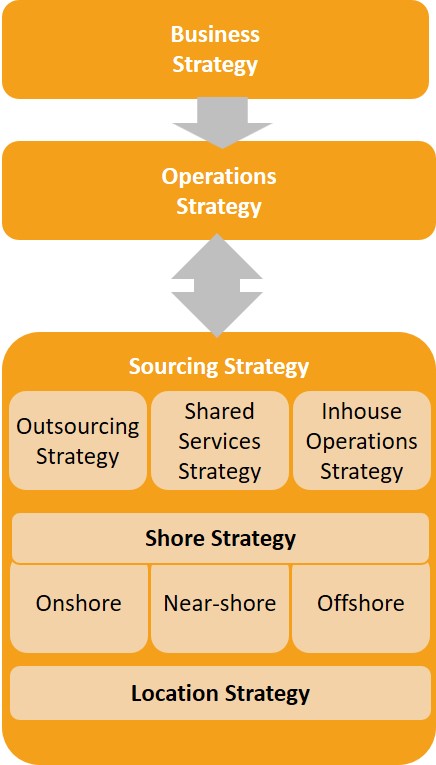
Our Strategy services, focus on developing Operational and Sourcing Strategies that are right for you and your organisation. There is no ‘cook book’ for a good Sourcing Strategy – one size does not fit all – but our unique Strategy methodology and supporting tools will help ensure a fully considered approach and help you get to the right options and conclusions quickly, and ensure you have a Strategy that is both deliverable and sustainable.
We’ve helped firms large and small, and across a range of industries, develop overall Sourcing Strategies, along with IT specific and Business specific Sourcing Strategies all focused on delivering tangible value and business outcomes. The advantage of using Hillbrooke to define your Sourcing strategy is;
- We are truly open minded – we don’t start with any pre-conceptions. We focus on a fact based consideration of the options.
- We give special attention to the way that stakeholders within the organisations are involved to establish commitment for the chosen Sourcing Strategy and the next steps.
- Our Strategies are practical, implementable, and sustainable. We apply blue sky thinking and bring it down to earth.
- Our methodology is based on practical and modular principles, providing a framework that can be readily adjusted to a Client specific situation or need. This enables us to apply it in addressing a range of Sourcing questions.
- The results of a Sourcing Strategy project or assignment can directly be used in the next stages of the Lifecycle such as Selection or Transition which increases Implementation success and reduces risks.
- We’ll stand behind our Strategy and commit to delivering it, but equally are not looking for a downstream commitment – it becomes your Strategy.
- Our Sourcing methodology is underpinned by a series of templates and tools that add rigour and help you accelerate the process.
- Our Approach aligns with our portfolio of Transformation and Sourcing services enabling you to leverage our expertise in Regulation, HR, Finance, IT, and Emerging Technology including Robotics (RPA), Data Analytics, and Cognitive Intelligence.
As Sourcing Strategies are tailored to meet the objectives of individual businesses, the outcomes have been varied, ranging from recommending the Re-insource of specific operational processes, to the complete Outsource of the middle and back office of a business in effect creating a virtual organisation that can concentrate solely on their value-adding customer activity. At times the resulting recommendation has been to create Shared Services Centres and a Global Shared Services organisation, while conversely we have also recommended the sale of a Captive Shared Service Centre. The only commonality in each of our Strategic recommendations is that every single one is driven by what is in the best interests of our Client given their unique circumstances.
If you’re thinking about developing or reviewing your Sourcing Strategy, and how Sourcing can be used as a more effective lever in Operational Transformation then talk to us. – We’re experts.
One of the Strategy Houses defining your Strategy?
We take blue sky thinking and then bring it down to earth. We take ‘strategy house’ thinking and then apply practical application to get you from where you are to where you want to be – fast. Our seasoned Sourcing professionals translate the aspiration into reality by applying our tools to the challenge and delivering a solution and road-map to get you there.
So, when McKinsey’s, Boston Consulting Group, or Bain & Co recommend that Outsourcing or Shared Services should form a key component in your Operational Strategy then get someone in that can make it happen. Get someone that specialises in the industry, that has done it before (many, many times) and can deliver the benefits quicker, bigger, and better. We ‘play nicely’ with other consulting firms as our Clients will testify to, as we always work in your best interests to deliver the best possible outcomes (and we’re notably lower cost.) Talk to us about Outsourcing and Shared Services execution to get the best results.
Solution
The Solution phase in the Sourcing Lifecycle is all about turning the Strategy into definable solutions that can be readily implemented. For an Outsourcing Solution this is typically focused on the Outsourcing (procurement) process, and for a Shared Service Solution the focus is on the detailed design process finalising location(s), processes, services, and activities prior to implementing.
Our Solution services are split into three areas – Outsourcing, Shared Services and In-house support.
Outsourcing Solution (External Service Provider)
Ensuring the overall success of an Outsource often comes down to a just a few key elements – appropriately defining the scope and Solution, selecting the right Service Provider and contracting them on the right basis (having a contract that drives the right behaviours) are chief among them – all of which are part of the Solution phase of the Sourcing Lifecycle.
It is easy to think that running a procurement exercise for an Outsource be it IT or Business Process/Transformation Outsourcing is the same as purchasing a new IT application or creating an agency contract. Those with experience in doing such things know better. The approach, effort, dynamics and complexity means it is so much more than any other type of procurement. The path taken is not easy to navigate without experience and specialist knowledge in order to maximise the benefits, minimise the risks, and do it effectively and efficiently.
It can seem easy to just create and sign a contract – but the ramifications of not appropriately scoping the project, defining the Solution, running an effective competitive or sole source process, or building a contract agreement that provides the necessary protections and importantly drives the right behaviours can lead to catastrophic failure of the Outsource. Further, there is often a drive for speed, but sacrificing quality for speed is invariably a mistake – although with the right experience, accelerators, and expertise you can get the right outcomes quickly.
Just as technology has evolved and the way we use it has gone through revolution over the past 5 – 10 years, so has the approach to contract and commercial models evolved in Outsourcing. What was ‘fit for purpose’ and considered cutting edge a decade ago in many cases should be now confined to history.
Our Solution design, definition, and execution services help you to turn the Strategy into a Solution(s) that can be readily implemented. We understand the nuances and differences between the various types of Outsource, not just between IT Outsource (ITO) and Business Process/Transformation Outsourcing (BPO/BTO) but within ITO and BPO, from Application Development Management (ADM) through to Finance & Accounting (FAO) and everything in between.
We also understand the important industry variations, be it driven by regulatory requirements, or business drivers. We use our experience, insights, and accelerators to deliver the right outcomes.
- Outsourcing Transaction / Procurement Process
- Service Provider Selection
- Commercial Negotiation
- Contract Negotiation
In a competitive process we can short-cut your long-list to short-list based on our Service Provider knowledge, and insight, or alternatively provide the tools to do a rapid ‘beauty parade’ (or Request for Information (RFI) process). We can accelerate the Request for Proposal (RFP) or Request for Solution (RFS) – depending on what is most appropriate for the programme. We will utilise the BAFO (Best and Final Offer) process to lock-in the benefits.
We can help you leverage competition to get a much better commercial, contractual and service outcome. Or, where you know which Service Provider you want to use (either new or renewal) then we will use our sole source process to make sure they stay ‘honest’ leveraging our benchmarking and industry best practice tools to ensure they meet the business case and you get the right Solution and contract.
The world does not stand still so we look to build in flexibility at both a macro and micro level to allow Outsourcing contracts to readily adapt to changing business requirements.
We can support you through complete Transaction Lifecycle – from project inception through Service Provider selection, contract execution, implementation and operation. We deliver sustainable outcomes, structuring deals to drive the right behaviours, provide the necessary protections, comply with regulatory requirements while minimising the risks and maximising benefits. – Talk to us.
Shared Services Solution (Internal Service Provider)
When building and developing a Shared Services Solution, all aspects of the operating model need to be fully considered including people, process, tools/technology, Governance, organisation, and location.
While many choose to start developing their Shared Services Solution by focusing on people/roles to transfer, it can be far more effective to take a process approach to developing your Shared Services Solution.
One highly debated and key aspect of defining a Shared Services Solution is deciding on the most appropriate organisational model, with the two most common approaches virtually polar opposites;
Global Shared Service
Whereby the Shared Services operation is effectively established as a separate company/operational unit within the organisation, reporting at group level, with its own Profit & Loss (P&L) responsibility, and a mandate to act as an Internal Service Provider providing its customers, the business functions (often in multiple territories) with back-office services.
Function Extension Shared Service
Whereby the Shared Services operation is often an extension of a business function integrated within the function operation, typically established as a cost-centre reporting directly into the business function and limited to only delivering processes/activities for that function.
Eg. A multi-service, multi-territory, and multi-functional enterprise providing Finance, HR, and Procurement services for the benefit of the wider organisation. This is typical of large multi-national pharmaceutical and manufacturing organisations.
Eg. A Finance Shared Service Centre which may be limited to providing a range of finance processes for a specific Business Unit or for a specific region/country finance function. This model is more typical of Insurance firms and country centric businesses.
The right organisational approach depends on the business structure and objectives. A further key aspect in developing the Shared Services Centre (SSC) Solution is whether the SSC needs to promote and attract activity to its function or whether the organisation mandates its use – this requires a different approach and focus to ensure Shared Services success.
We help to build and develop Shared Services Solutions. In doing so we consider all the aspects so as to make the Shared Services Solution a success for both the benefit of the Shared Services operation and the business. We can help with;
- Operating Model Definition (People, Processes, Tools/Technology)
- Shared Services Centre Location Selection
- Organisational Model Definition
- Governance Model Definition
- Identifying and defining processes and activities to transfer to Shared Service
- Establishing Shared Services as in Internal Service Provider – applying Outsourcing practices in Service Levels, Governance, Transition, Transformation, and Operational Performance
We help our Clients Shared Services operation to be successful. – Talk to us.
In-house Transformation Solutions
Shared Services and Outsourcing are not always the right answer for your business. Sometimes it is better to do things ‘inhouse’, in function, in country. However, the challenge to still deliver step-change cost reduction, improve services, and drive out more value remains. We can help you to apply the Transformation tools to deliver those improvements – quickly, cheaply, and efficiently.
We can provide the support you need to drive Change in your organisation and deploy the latest techniques and technologies including;
- Robotics (RPA)
- Cognitive Intelligence
- Data Analytics
- 6sigma / LEAN
We help you to develop the solution that best addresses your operational requirements, developing the plans to enable efficient implementation that will deliver tangible results. Interested in how we can help you design a solution to transform your operation. – Talk to us.
Our role in your Sourcing programme
We can support you through the complete outsourcing transaction lifecycle, and fulfil a range of roles including;
- Sourcing Process Lead
- Commercial Negotiator
- Contract Negotiator
- Programme Manager
- Transition Manager
- Solution Architect
- Technical Design Architect (TDA)
- Financial Architect
- Procurement Lead
- Regulatory Compliance Manager
- Risk Manager
- Transition / Project Manager
We can be whatever you want us to be and do whatever you need doing. Our Advisors are Practitioners, we don’t sit on the sidelines directing and observing we roll-up our sleeves and get stuck-in. We’ll be there, standing right next to you (or in front of you, or behind you) – wherever you need us.
Want to understand more about the levers you can use to transform your business operation – just click here;
Transition
Transition is all about the execution – it’s where the ‘rubber hits the road’.
The Transition phase is often the first test as to whether you have the the right Solution and in the case of Outsourcing the right Service Provider that has been engaged under a robust contract that drives the right behaviours. In developing Transition and Transformation (T&T) plans it doesn’t matter how many hours have gone into them, how many risks mitigated, how many dependencies identified, or how good the graphics are – what matters is delivering them.
The key to successful Transition is strong initial planning, the right team, clear responsibilities, regular communication, actively managed dependencies, and accepting that there are risks in everything – even standing still. Change is rarely easy, and you can be assured that even with the best made plans, there will always be some things that don’t quite go as expected. It is how you handle these issues that truly separates world class Transition Management from just good Transition Management.
We have developed significant expertise in managing and overseeing complex Transition Programmes and Change Portfolios. Our team of practitioners include specialists in Programme Management, Portfolio Management, Project Management, Transition Management and Change Management. They have worked across industry and across the functions including IT, Finance, HR and Operations. We then equip them with the tools to do an effective job from Planning Guidelines, RAID (risks, assumption, issues, dependencies) Logs, Stakeholder Mapping Tools, Stakeholder Comms. Templates, Project Management Office (PMO) Templates, CSF (Critical Success Factor) Templates, Progress Reporting Templates and Regulatory Checklists.
We help our Clients to successfully deliver Change by providing;

Hillbrooke provides Programme Managment capability.
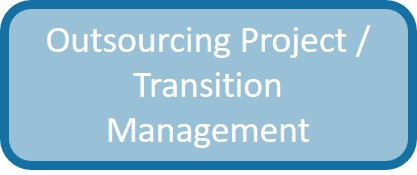
In Outsourcing, Clients typically have two roles in Transition, the first is holding the Service Provider(s) accountable for the delivery of their Transition & Transformation(T&T) plans and the achievement of the key milestones, and the second role is in the management of the Client responsibilities and dependencies within the T&T plan that the Provider has for the Client. Given the tension between these roles, it is good practice for them to be performed by separate Client representatives. Our highly trained Project Managers have the experience in delivering successful outcomes in either role.
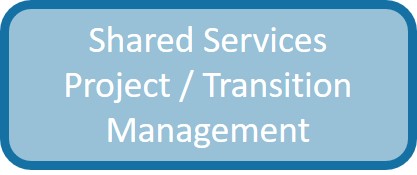
For Shared Services then there are typically both ‘pitcher’ and ‘catcher’ Project Managers with the ‘Pitcher’ representing the Client business function managing the movement of processes, activities, and services from the Client function to the Shared Services operation, whereas the ‘Catcher’ acts for the Shared Services organisation in implementing the new processes, activities, and services within the Shared Services organisation. While both roles have a common goal – successful Transition – there are many advantages to these being separate roles given the potentially conflicting priorities which are exaggerated when it comes to larger-scale Transition programmes. Our Project Managers have the necessary skillset, training, and experience to deliver a successful Shared Services Transition project.

In addition to providing Programme and Project/Transition Managers, Hillbrooke can provide all the resources necessary to fill any ‘gaps’ in your Transition and Transformation Programme Team. We can provide highly trained, highly skilled, and experienced staff that can perform the following roles;
- HR Change Specialists (including expertise in managing TUPE processes)
- Business Change Managers
- IT Change Managers
- Communications Managers
- Project Management Office (PMO) Managers
- FInancial Architects
- Subject Matter Experts

We assess the Programme project portfolio ensuring they link to the business objectives and that the dependencies are understood, and the risks mitigated. We provide a robust review of projects, support stakeholder management, set priorities, provide direction, and focus on the outcomes.

We train Client teams to deliver successful Outsourcing and Shared Services Transition and Transformation programmes. We help Clients to combine strong Project and Programme Management disciplines with the unique challenges of moving roles, processes and services to third parties or to new locations be they onshore, near-shore, or offshore. It is important to note that best practice in IT Change is very different from best practice in Operational Change. – Let us help you to increase your Transition success rate.
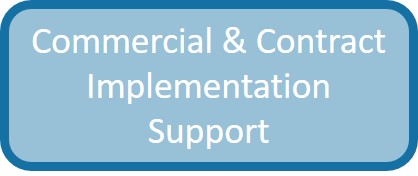
We assess Service Provider performance against the contract and lead any negotiation on any issue of interpretation that may arise. We provide support to the Governance Team and the Operations Team in understanding, leveraging, and implementing the contract agreement.

We help build Post-Transition Governance Organisations to manage and oversee the Outsourcing or Shared Service relationship to ensure the services delivered meet expectation. We help establish effective processes for Benefit Tracking, Financial Management, Contract and Service Management. We help Business Operations adjust to the new world and to make the necessary changes in behaviour required when moving from ‘being able to directly do things’ to ‘effective management of getting others to do them for you’.
If you need support in making your Strategy come to life and your Solution a reality, then talk to us. We can lead or just provide support to your Transition and Transformation programme. – We can make it happen.
We can get you from A to B.
We can make your Strategy and Solution a reality. We make things happen. We can can provide all the necessary resources and expertise to get you from here to your Target Operating Model (TOM) safely and quickly. Talk to us.
Optimisation
The Optimisation phase focuses on how to ensure the Sourcing arrangements achieve and maintain an optimum level of performance – both from a service and a financial perspective.
Nothing stands still. So, following on from Transition and Transformation it is important to instigate continual improvement. Particular consideration needs to be given to effective Service Provider management and also within the Client organisation to ensure that demand is managed effectively, and obligations delivered on.
Optimisation is all about creating the conditions such that the Sourcing arrangements can flourish, so that they not only meet but exceed their initial objectives.
It is important to build a culture of continual improvement and to constantly invest in the relationship. It is all too easy for service provision and relationships to become stale, agreement objectives to become diluted or overlooked, and the alignment of once agreed project objectives to be pulled in separate directions by differing party agendas, sometimes resulting in the need to push a ‘reset’ button.
Our specialist Optimisation services include;
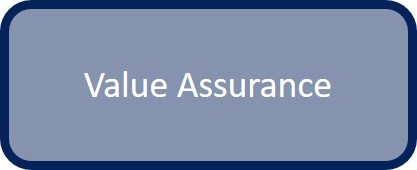
An assessment of the full Sourcing arrangement considering all aspects including Service, Change and Financial Performance, together with considering People, Plan, Process and Perception. This leverages our market leading Value Assurance IP coupled with our Benchmarking capability. The output being a jointly sponsored action plan to address any weaknesses and provide a firm platform for the development of the service.

Our Benchmarking capability extends beyond purely price and cost analysis, to service level setting and performance, as well as contractual and commercial terms. We can assess whether you are getting the right price and the right service as compared with the market.

An objective review of how the benefits have been realised when compared with the original business case and the programme objectives.
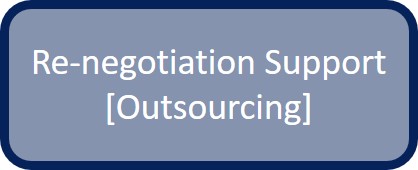
Supporting Clients with the re-negotiation and re-alignment of the service to better meet the needs and requirements of the Client business going forward.
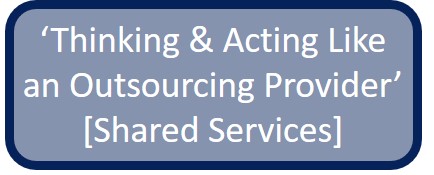
We help the Client’s Shared Services organisation transform into a customer-centric organisation, applying Outsourcing disciplines and practices to their internal Shared Service operation. This may include Service Level Setting, ‘Internal Contracts’, Codes of Conduct, Charging Mechanisms, Performance Management, and ongoing Governance.
If you think you can or should be getting more out of your Sourcing arrangements, then undoubtedly you can. We help Clients by assessing their Sourcing arrangements and providing practical action plans to optimise performance and benefit realisation. If you want to learn more about how we do this, then talk to us. – We make a difference.
Governance
The power of effective Governance to improve profitability, drive costs down, improve the quality of services, and the customer experience cannot be underestimated.
Weak Governance destroys Value and is by far the biggest cause of Value Leakage in Shared Services and Outsourcing arrangements. A sustained commitment is required to effectively manage the Service Provider (be they internal or external), with rigorous tracking and management of performance and benefits, and managing the change and evolution of the service. It requires commitment and appropriate investment.
Few would disagree with the importance of Governance, although remarkably it is often neglected, de-prioritised, and typically poorly implemented and managed. Frequently there is a ‘sign and forget’ mentality which is compounded when Transition gives way to ‘business as usual’. This under-investment and lack of focus will lead to the gradual (and sometimes rapid) deterioration of the arrangement over the term, with value not being fully realised and commercial obligations being missed. – As with all aspects of business there is a constant requirement to nurture and invest in, making it relevant and a constant success.
The difference between poor Governance practice and best practice application is vast, and all too often crisis points are reached before effective action is taken. Furthermore, just as the world doesn’t stand still, effective agreements be they with an internal Shared Services Centre or an Outsource provider, need to change and evolve over time. What was fit 5 years ago is unlikely to be fit today. This means that when it comes to Change, not only is it important to have a good Service Provider relationship but this needs to be protected by a good contractual agreement that includes not only Change Control provisions but built-in mechanisms that enable Change in the service delivery, focus, and objectives. This may be from simple things such as managing volume increases/reductions, adding new service levels or re-allocating service credits to different service levels, through to adding or removing functions, territories, and services.
When it comes to Outsourcing, it doesn’t matter how good the Strategy was, how leading edge the Solution developed, how brilliantly the Transition was managed, how strong the Contract is, if it is then neglected and poorly managed then like any relationship it will fail.
Our services allow our Clients to:
- Maximise the benefits from their Sourcing arrangements.
- Establish robust Sourcing Governance / Service Management.
- Assess and improve the performance of the Sourcing Governance Organisation.
- Identify opportunities for improvement and address deficiencies in service and performance.
- Minimise the risks within the Sourcing landscape and any Value Leakage.
- Drive the right behaviours in the Service Providers.
- Develop win:win relationships and a culture of continual improvement.
- Manage and align the wider stakeholder community.
- Enhance the Governance Operating Model (process, people, tools/technology).
- Improve relationships with Service Providers.
- Support effective management of the Sourcing Lifecycle for key service provision and for the portfolio of services.
Our specific Governance services in support of our Clients include;
- Sourcing Governance Review.
- Sourcing Organisation/Function Review.
- Defining and establishing a Sourcing Governance Organisation.
- Service Provider Governance.
- Supply Chain Review.
- Outsourcing Contract Review.
- Distressed Relationship Remediation.
- Regulatory Compliance Assessment (Financial Services).
- Internal Governance Function Review.
- Balanced Scorecard Development and Implementation.
When it comes to putting effective Governance in place get some expert help. Why learn from mistakes, when you can get it right first time. – Talk to us.




